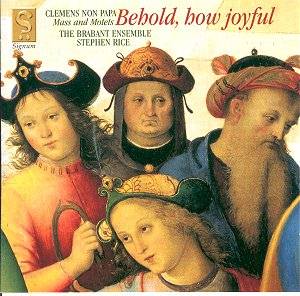The 16th
century Flemish composer Clemens non
Papa wrote a considerable body of music,
but has left musicologists precious
little biographical material. His whereabouts
is certain for just a handful of 16th
century dates. But he is one of the
century’s most published musicians.
Fifteen masses and over two hundred
motets survive, though some of these
are also attributed to his contemporary
Thomas Crécquillon. Even his
nick-name, non Papa (literally,
‘not the Pope’) has given rise to some
speculation. The booklet in this disc
refers to some remarkable new discoveries
in this area by Henri Vanhulst, but
frustratingly does not say what they
are.
The Brabant Ensemble
is a vocal ensemble of some fourteen
voices which was formed in 1998 by the
Oxford-based performer and musicologist,
Stephen Rice. Rice has recently completed
his doctorate on the motets of Nicholas
Gombert and formed the Ensemble to perform
sacred music from the 16th
century, with emphasis on Flemish composers.
For this disc they
have formed a programme around Clemens
non Papa’s mass ‘Missa Ecce quam bonum’.
The programme opens with the motet,
‘Ecce quam bonum’ (a setting from Psalm
133) on which the mass is based. ‘Ecce
quam bonum’ is a 6-part motet and, as
was common at the time in parody masses,
‘Missa Ecce quam bonum’ is initially
in 5–parts, Clemens non Papa dropping
one of the lowest parts. It was also
common for such masses to have an addition
voice added in the final Agnus Dei,
however Clemens non Papa adds an extra
voice from the Sanctus onwards. But
instead of reverting to the vocal layout
of the motet, Clemens non Papa adds
a second tenor part which sings in canon
with the first tenor. This creates some
stunningly lovely effects.
Rather sensibly, instead
of performing the mass in one solid
lump, Rice intersperses it with 4 of
Clemens non Papa’s motets to create
a quasi liturgical programme. The disc
finishes with a secular work, a state
motet addressed to the Holy Roman Emperor
Charles V and his son Philip, probably
dating from the latter’s investiture
as Regent of the Low Countries.
The disc was recorded
in the Chapel of Merton College, Oxford
and seems to bring with it a strong
whiff of the collegiate sound-world
– with all its good (and bad) points.
The Brabant Ensemble has a lovely clear
sound – rather bright and not a little
Oxbridge in sound. 14 singers are credited
on the recording, with a mix of male
and female altos. They sing with multiple
voices per part but with judicious use
of solo voices. They display fine musicianship
with a good feel for the music of the
period. All their performances on the
disc are of a high quality and the singers
have a good feel for the shape and line
of the music.
But I could have wished
for better diction and I wished they
had allowed the sound and sense of the
text to colour the music more. They
sing the music in good straight versions.
I should not really ask for more, but
I would dearly have liked more of a
feeling of passion.
The catalogue is not
overly endowed with recordings of Clemens
non Papa’s music so this highly musical
version of one of his masses is to be
recommended.
Robert Hugill


